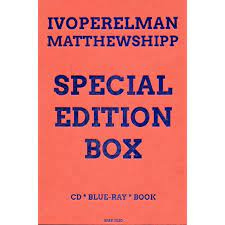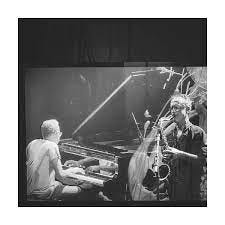Roundup: Secrets From Several Vaults
New This Week: Some of the earliest commercial recordings made in Japan
The archival release that’s likely to draw sustained media attention this week is Tony Joe White’s Smoke From The Chimney. The album, produced by multi-instrumentalist Dan Auerbach of the Black Keys, contains nine previously unheard songs White wrote and recorded, demo-style in his home studio, before his death in 2018 at age 75.
The raw material is just sketches White did alone, using just his acoustic guitar and affect-free, magnetically craggy voice. Atop that foundation, Auerbach built full-band arrangements featuring horns, backing vocals and multiple guitars (some leads are from Marcus King, some pedal-steel finery is by Paul Franklin). The music straddles fences between Southern soul and country rock – familiar terrain for White, who wrote “Polk Salad Annie” and “Rainy Night in Georgia,” among others. It’s blazingly alive, and at times almost disproportionately extroverted – a revue with terse, sometimes whispered vocals at its center.
Auerbach clearly spent time with White’s songs, which can appear to be deceptively simple from a distance. He burrowed into the metaphoric layers, found the tension simmering in the back rooms of the narratives. He leaves space between the truthtelling cadences of “Listen To Your Song” so those emotional undercurrents can emerge. On the norteno-influenced ballad “Del Rio, You’re Making Me Cry,” Auerbach shows keen understanding of shading and contour: He seems to know just how many steps toward Hollywood to take, and when to leave White under a lone spotlight. That happens most memorably in the bridge, where White’s words – about winners and losers and those who lack the courage to play the game – sound cliched, and possibly dashed off. Yet somehow resonate like prophecy.
In most cases, these verses are not stray back-of-the-notebook leftovers; they’re finished pieces that deserve inclusion in White’s overstuffed songbook, alongside tunes memorably recorded by Ray Charles, Tina Turner, Elvis Presley, Waylon Jennings and others. Sure, these solid and sturdy compositions would shine under that kind of star treatment. But they grow somehow more dimensional when centered around White’s wry, human-scale, confidingly intimate vocals.
***
It couldn’t have been easy to construct full productions from spontaneous one-take solo tracks. But the skill and sensitivity Auerbach displays here engenders hope that someday we might hear similarly expanded demos from other songwriters. I’m starting a list.
That’s the thing about the realm of dusty deep storage: When you start to really ponder what’s laying around waiting to be discovered, it quickly triggers curiosity about the unforeseen and the previously unimaginable. Right now I want to know more about what’s being excavated than what’s being created. In saying that, I mean no disrespect to Selena Gomez and current hitmakers. But really: What’s going to crack your head wide open faster? Another candied dancepop production or the faint unsteady sound of a Japanese woman singing a folk melody into a primitive microphone in 1906?
Just released on Sublime Frequencies, Sound Storing Machines – The First 78rpm Records from Japan, 1903 – 1912 offers a glimpse into Japanese music in the years before there was widespread contact between Japan and the West. It’s a warts-and-all situation: There’s static and turntable noise throughout, and the instruments – the guitar-like shamisen and several xylophone type mallet instruments – at times are more prominent than the often-distant vocals.
The material was captured by an American musician and recording engineer named Fred Gaisberg. On assignment from London-based Gramophone Company, Gaisberg traveled all over the world documenting music. In Japan, he captured a range of styles, including stately ritual music of the aristocratic class as well as short pieces featuring confident instrumentalists who alternate between playing melodies and improvising. Some vocalists seem to be improvising as well: “Kappore,” from 1903, has a declarative quality that recalls the impulsive exclamations of early bluesmen. Even if you only duck into this for a minute, you won’t forget it.
&…
There’s at least one more staggeringly inventive release this week: A beautiful audio/video set from the long-running duo of tenor saxophonist Ivo Perelman and pianist Matthew Shipp. Special Edition Box contains the duo’s alternately placid and provocative 2019 studio work Procedural Language alongside a concert captured six months later in Sao Paulo. It’s a focused close-up look at two sides of the in-the-moment creative process, featuring a pairing that’s been sometimes taken for granted. (Or otherwise misunderstood.)
Perelman was born in Brazil and now lives in New York; with a discography somewhere around 100 titles, he’s among the most well-documented improvising artists of the last 20 years. Shipp is a deep thinker who’s revered not just because he’s fluent in so many jazz languages: He’s the rare pianist who can uphold the conventions of a particular style while maintaining his strong individual voice.
The studio portion starts in a nocturnal mood: Using muted and somber chording, Shipp follows Perelman as the saxophonist muses through ideas that have a melancholy tinge. While fully improvised, the pieces are short: It’s as though the two decided ahead of time to honor and exploit the natural pauses in a conversation. The live on Blu-Ray concert from Sao Paulo is more open-ended, less disciplined in an attractive way. It’s another of the bunch of Perelman records that depend on his inexhaustible supply of melodies and inventions, and on Shipp’s superhuman ability to thread those ideas into a constantly mutating, never quite resolving journey.
Why yes, we have a fancy digital suggestion box. Share your favorite Underloved/Overlooked records here: echolocatormusic@gmail.com.
Please consider subscribing (it’s free!). And…..please spread the word! (This only works via word of mouth!)









